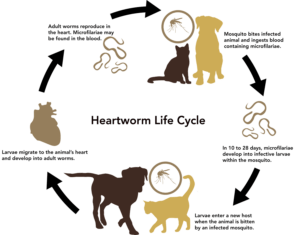Canine Heartworm infestation has become a severe problem in Texas along with the rest of the United States. It's a real and prevalent problem here in Texas. Heartworms (Dirofilaria immitus) are literally worms that invade a dog's heart and lung vessels.
Heartworms are transmitted via female mosquitoes. The mosquito bites an infected dog and then harbors the parasite. When they bite another animal the parasite is transmitted to that animal. If the animal is not on heartworm preventative, infestation results. All dogs, regardless of breed or housing location (indoor or out, by water or not) are equally susceptible to this disease.

 There are two components to the heartworm process. The mosquitoes transmit immature worms, Microfilaria, into the dog's tissues. The microfilaria mature into adult heartworms and move into the bloodstream to take up residence in the dogs heart. These adults reproduce more microfilaria and the cycle perpetuates, producing more and more adult worms in the dog's heart. The entire maturation cycle can take up to 6 months.
There are two components to the heartworm process. The mosquitoes transmit immature worms, Microfilaria, into the dog's tissues. The microfilaria mature into adult heartworms and move into the bloodstream to take up residence in the dogs heart. These adults reproduce more microfilaria and the cycle perpetuates, producing more and more adult worms in the dog's heart. The entire maturation cycle can take up to 6 months.
Heartworm disease represents a serious health risk to the animal. The worms interfere with the normal blood flow from the right side of the heart into the lungs. If left untreated they reduce the dogs quality of life, cause congestive heart failure, organ damage and ultimately death.
Signs and symptoms of heartworm disease vary depending on the duration of infection. Dogs may not show any signs in the early stages. As the heartworms grow and mature, symptoms include fatigue, tiring easily after exercise, occasional to persistent cough and anemia. As the case advances, congestive heart failure may develop along with liver, kidney and blood flow problems.
If your dog is diagnosed with heartworms, he/she can be treated. However, treatment is much more costly (up to 4-5 times the cost of a year's supply of prevention) and difficult on the dog, than prevention. Current treatment methods consist of hospitalizing the dog and giving injections of an arsenical (yes arsenic) drug to kill the adult worms. The injections are painful and the dog remains sore for awhile. Complications such as vomiting, failure to eat, drug reactions, blood clots in the lungs, etc. can arise but are fairly rare.
After the treatment, the animal must be kept confined and quiet for 3-4 weeks as determined by your veterinarian. The dog is not allowed any activity that increases his/her heart rate. This rest period is done because the adult worms, now dead, must be reabsorbed and eliminated by the body. During this clean up phase, a portion of dead worm can move into the blood vessels of the lungs and cause a clot (embolus) which can be life-threatening. The "rest" portion of the treatment is essential to ensure the pets safety. After treatment, the dog is placed on heartworm preventative to prevent re-infection and kill any remaining microfilaria that might still be resident in the tissues. Dogs not placed on preventative can become re-infested.
Heartworm disease is completely preventable. Several products are on the market today which prevent heartworms by killing the microfilaria. Most are given in a single monthly dose and must be given year round for the remainder of the dogs' life. Years ago, it was felt there were heartworm "seasons", and that preventative was only necessary during certain months. This has proven false and the prevention must be given year round to afford adequate protection for your pet.
Some Heartworm prevention preparations have flea control and/or worming agents in the once monthly pill to kill a variety of parasites for your convenience. Check with your veterinarian to determine which is right for your pet. Heartworm prevention manufacturers actually warranty the effectiveness of the prevention. The makers of Sentinel/Interceptor and HeartGard will pay for heartworm treatment if your dog is on their product for at least six months and becomes heartworm positive. Prevention is not only best, it comes with insurance!
For more information visit the Heartworm Society or refer to our Heartworm Prevention article.
Note: Gold Ribbon Rescue tests all rescue dogs for heartworms and starts them on preventative. GRR mandates that all rescue dogs be given heartworm preventative for the remainder of it's life.